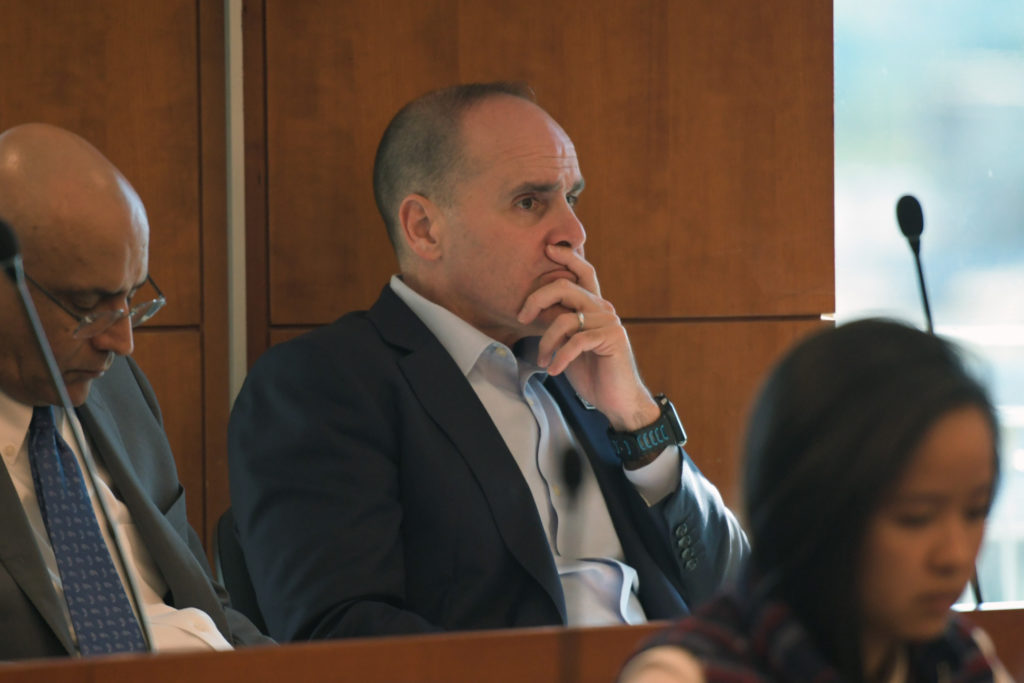After five months in his role, GW’s top financial decision-maker is pulling together a team of direct reports.
Executive Vice President and Treasurer Mark Diaz told employees last week that he would add more responsibilities to the roles of some of the top administrators in the finance, tax and business divisions. Diaz said he hoped the changes would better allow GW’s financial divisions to interact and collaborate in a “large and complex organization.”
“An opportunity exists to flatten our organization and ensure greater coordination and collaboration at the leadership level,” Diaz said in an email to staff, which was obtained by The Hatchet.
He announced three new hires on the business and finance team, including new managers for the accounting, benefits and business management teams.
Sharon Heinle, the associate vice president and comptroller, will serve as the University controller and will head accounting responsibilities, including those for grants, properties and the University’s $1.7 billion endowment. She will also supervise tax matters and will “lead the development of appropriate strategies for financial systems operations,” Diaz said.
The Systems, Analytics and Insights Group and the tax department will report to Heinle, Diaz said.
Jennifer Lopez, the new associate vice president for total rewards and the former associate vice president for tax, payroll and benefits, will take on more benefits-related responsibilities, including employee compensation and “recognition strategies,” Diaz said.
“She will be the champion for workforce strategies and related administration to ensure competitive compensation and recognition programs at the University,” he said. “This position is a vital cog in our culture initiative efforts at the University.”
University President Thomas LeBlanc has prioritized improving the institutional culture since he arrived at GW a year and a half ago. He recently oversaw the distribution of a culture survey to faculty and staff, who said the University should focus more on employee recognition, communication, leadership accountability and service culture.
Erin Summers, Diaz’s chief of staff, will also temporarily lead the Business Management and Analysis Group while Diaz decides “how best to leverage the talents and value this team brings to the University.”
University spokeswoman Lindsay Hamilton declined to answer nine questions about Diaz’s leadership team, deferring to the email sent to staff.
She declined to say how the new structure of the departments increases coordination between divisions. She also declined to say how the culture leadership team weighed in on the decision to update the structure.
She declined to say why adding additional responsibilities to Heinle’s and Lopez’s roles is beneficial to the University culture. She declined to say when a permanent leader for the business analytics group is expected to be found.
Hamilton declined to say how Diaz will assess the effectiveness of the new structure. She also declined to say what kind of research and assessment was done to determine the benefits of the structure.
She declined to say if the University is saving money by keeping some positions on Diaz’s team vacant. She also declined to say if the University plans to hire any new staff in association with the announced changes.
Charles Garris, the former chair of the Faculty Senate, said it is not obvious how the changes in the structure of the office would make the organization more collaborative, but it is important that Diaz is taking some first steps to ensure officials are working together more frequently.
“He’s got his marching orders, and he’s working on it,” Garris said.
He said the changes already demonstrate that Diaz is a different kind of financial manager than his predecessor Lou Katz, who retired last spring after nearly three decades. He said that while Katz managed to get the University out of financial crises, he didn’t often take risks or shake things up – a quality he said more officials would benefit from.
Joseph Cordes, the co-chair of the Faculty Senate benefits committee, said Lopez, the other co-chair of the benefits committee, has worked well with faculty to help them advise the University on the needs of faculty, especially in the complicated area of health care benefits.
He said faculty need to be educated about how the University’s health care coverage works if they would like to make smart decisions and advise the administration. Lopez has offered explanations on the subject several times, Cordes said.
“She runs the committee very, very well,” he said.
Cordes said the University controller’s role will now be similar to the job’s previous description before Ann McCorvey, the former deputy executive vice president and treasurer, came to GW in 2013. McCorvey announced earlier this month that she will leave GW to become the chief financial officer at Davidson College.
Cordes said McCorvey wrote the University’s annual finance reports during her tenure, but that responsibility will now fall back into the wheelhouse of the University controller.
James Antony, a senior lecturer and director of the Higher Education Program at Harvard University, said it is typical that an administrator would still work on building their direct team five months after taking on their role. If the University has hired a treasurer who is good at his job, he will take his time to explore the office and its full potential, Antony said.
“No one person gets any one thing done at a complex organization,” he said. “You have to make sure your team is working optimally.”





